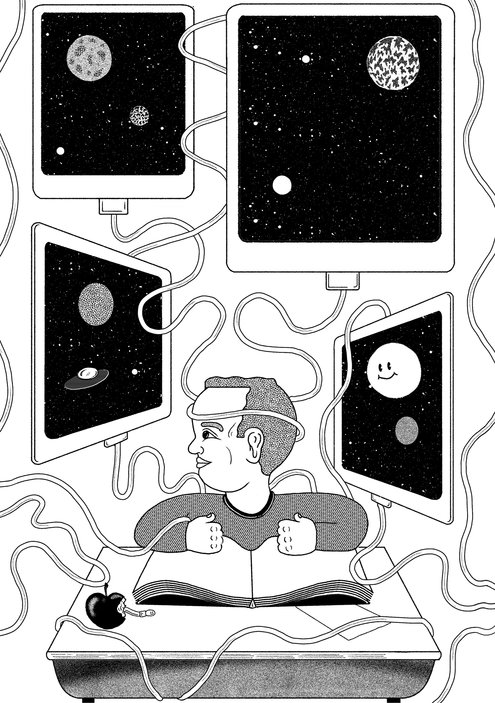In other words, every activity that didn’t involve a screen was linked to more happiness, and every activity that involved a screen was linked to less happiness. The differences were considerable: Teens who spent more than five hours a day online were twice as likely to be unhappy as those who spent less than an hour a day.
Tag: technology
Take Notes by Hand for Better Long-Term Comprehension
- The results revealed that while the two types of note-takers performed equally well on questions that involved recalling facts, laptop note-takers performed significantly worse on the conceptual questions.
- The benefit of having more content is canceled out by “mindless transcription.”
- The amount of verbatim overlap was associated with worse performance on conceptual items.
What You Miss When You Take Notes on Your Laptop
- Mueller and Oppenheimer predicted that the decrease in retention appeared to be due to “verbatim transcription.”
- And again, though the laptop note takers recorded a larger amount of notes, the longhand note takers performed better on conceptual, and this time factual, questions.
A Learning Secret: Don’t Take Notes with a Laptop
- Students who used longhand remembered more and had a deeper understanding of the material
Investing heavily in school computers and classroom technology does not improve pupils’ performance, according to a global study from the OECD.
Attention, Students: Put Your Laptops Away

- For questions that asked students to simply remember facts, like dates, both groups did equally well.
- But for “conceptual-application” questions, such as, “How do Japan and Sweden differ in their approaches to equality within their societies?” the laptop users did “significantly worse.”
- “The students who were taking longhand notes in our studies were forced to be more selective — because you can’t write as fast as you can type. And that extra processing of the material that they were doing benefited them.”
Can Students Have Too Much Tech?

- “Students who gain access to a home computer between the 5th and 8th grades tend to witness a persistent decline in reading and math scores,” the economists wrote, adding that license to surf the Internet was also linked to lower grades in younger children.
- What’s worse, the weaker students (boys, African-Americans) were more adversely affected than the rest. When their computers arrived, their reading scores fell off a cliff.
- With no adults to supervise them, many kids used their networked devices not for schoolwork, but to play games, troll social media and download entertainment. (And why not? Given their druthers, most adults would do the same.)
- Technology does have a role in education. But as Randy Yerrick, a professor of education at the University at Buffalo, told me, it is worth the investment only when it’s perfectly suited to the task, in science simulations, for example, or to teach students with learning disabilities.
Can Students Have Too Much Tech?
Laptop versus hand-written notes
The present research suggests that even when laptops are used solely to take notes, they may still be impairing learning because their use results in shallower processing. In three studies, we found that students who took notes on laptops performed worse on conceptual questions than students who took notes longhand. We show that whereas taking more notes can be beneficial, laptop note takers’ tendency to transcribe lectures verbatim rather than processing information and reframing it in their own words is detrimental to learning.
What’s 12 x 11? Um, Let Me Google That

What’s 12 x 11? Um, Let Me Google That
- My classroom experience proves otherwise. Once students have memorized a given set of vocabulary and grammar rules, they are able to apply their knowledge to more difficult concepts and activities. Having the fundamentals at the ready gives them both skill and confidence, two attributes that make learning effective and enjoyable. If they skipped the memory work on the grounds that the information can easily be found online, they would drown in a sea of URLs as they struggled to find the basic information necessary to answer the deeper questions.
- I shudder at what might have happened to the Apollo 13 flight crew if its NASA team had to spend precious minutes looking up multiplication tables, or what will happen if our government’s national-security advisers needed to consult Wikipedia to shape their foreign policy decisions.
- But once John Dewey’s educational theories were adopted in public schools beginning in the 1940s, they fell out of vogue, ridiculed and rejected by education professionals across the country as detrimental to learning. In schools of education such techniques are derisively labeled “drill and kill” and “chalk and talk.” Instead, these experts preach “child-centered” learning activities that make the teacher the “facilitator” in education, which is understood as a natural process of self-discovery.
- Of course, all good teachers want their students to acquire not just basic knowledge, but a deeper, conceptual understanding that is manifested through critical thinking and analysis—skills that educational fads and initiatives rightly extol. But such thinking is impossible without first acquiring rock-solid knowledge of the foundational elements upon which the pyramid of cognition rests.
The Touch-Screen Generation
- Before hiding Piglet, the researcher effectively engaged the children in a form of media training. She asked them questions about their siblings, pets, and toys. She played Simon Says with them and invited them to sing popular songs with her. She told them to look for a sticker under a chair in their room. She gave them the distinct impression that she—this person on the screen—could interact with them, and that what she had to say was relevant to the world they lived in.

Silicon Valley School That Doesn’t Compute
- Not a computer to be found. No screens at all. They are not allowed in the classroom, and the school even frowns on their use at home.
- And where advocates for stocking classrooms with technology say children need computer time to compete in the modern world, Waldorf parents counter: what’s the rush, given how easy it is to pick up those skills? “It’s supereasy. It’s like learning to use toothpaste,” Mr. Eagle said. “At Google and all these places, we make technology as brain-dead easy to use as possible. There’s no reason why kids can’t figure it out when they get older.”
 Young children—even toddlers—are spending more and more time with digital technology. What will it mean for their development?
Young children—even toddlers—are spending more and more time with digital technology. What will it mean for their development?